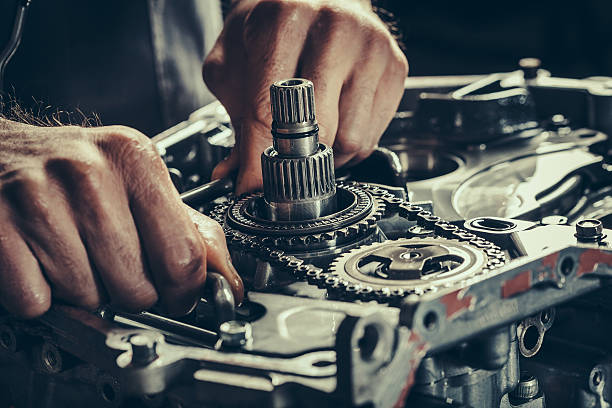Automotive Engine Repair: Essential Skills and Career Training
Engine repair training offers practical skills for understanding how vehicles operate and maintaining them effectively. Learning about different engine components, diagnostic techniques, and hands-on repair practices can help build confidence and knowledge for those interested in automotive care.

What Are Automotive Engine Repair Courses
Automotive engine repair courses are structured educational programs designed to teach students the fundamental principles of internal combustion engines. These courses cover essential topics including engine anatomy, fuel systems, ignition systems, cooling systems, and lubrication systems. Students learn to identify common engine problems, perform routine maintenance tasks, and execute complex repairs using industry-standard tools and diagnostic equipment.
Most programs combine theoretical classroom instruction with practical workshop experience, allowing students to work on real engines and vehicles. The curriculum typically includes safety protocols, environmental regulations, and proper disposal methods for automotive fluids and components.
Engine Repair Training for Beginners: Getting Started
Engine repair training for beginners focuses on building a solid foundation in automotive fundamentals. Entry-level programs typically start with basic mechanical concepts, tool identification, and safety procedures before progressing to engine-specific topics.
Beginners learn about four-stroke engine operation, cylinder head components, valve trains, and piston assemblies. Training often includes hands-on exercises such as engine disassembly and reassembly, basic tune-ups, and oil changes. Many programs also introduce students to computerized diagnostic systems and electronic fuel injection, which are standard in modern vehicles.
Successful completion of beginner courses typically requires 3-12 months, depending on whether students attend full-time or part-time programs.
Engine Maintenance and Repair Courses: Advanced Techniques
Engine maintenance and repair courses build upon foundational knowledge to cover more complex diagnostic and repair procedures. Advanced coursework includes engine rebuilding, performance modifications, and troubleshooting sophisticated electronic systems.
Students learn to use advanced diagnostic equipment such as oscilloscopes, compression testers, and engine analyzers. The curriculum covers timing belt replacement, head gasket repairs, and engine block machining. Many programs also address hybrid and electric vehicle technologies, preparing students for the evolving automotive landscape.
These courses often require prerequisite knowledge or completion of basic automotive training programs.
Training Program Options and Formats
Engine repair education is available through various educational institutions and formats. Community colleges offer associate degree programs in automotive technology, while technical schools provide certificate programs focused specifically on engine repair. Some programs offer evening or weekend classes to accommodate working professionals.
Online components are increasingly common, covering theoretical aspects of engine operation and diagnostic procedures. However, hands-on experience remains essential and must be completed in person at equipped facilities.
Apprenticeeship programs combine classroom learning with paid work experience at automotive repair shops or dealerships, providing real-world application of skills while earning income.
Cost Analysis and Program Comparison
Engine repair education costs vary significantly based on program type, duration, and institution. Understanding these financial considerations helps prospective students make informed decisions about their education investment.
| Program Type | Institution | Duration | Cost Estimation |
|---|---|---|---|
| Certificate Program | Lincoln Technical Institute | 9-15 months | $20,000-$35,000 |
| Associate Degree | Community College | 2 years | $3,000-$8,000 |
| Apprenticeship | Local Dealerships | 2-4 years | Paid education |
| Online Hybrid | Penn Foster | 12-18 months | $15,000-$25,000 |
| Specialized Program | Automotive Education Center | 6-12 months | $10,000-$20,000 |
Prices, rates, or cost estimates mentioned in this article are based on the latest available information but may change over time. Independent research is advised before making financial decisions.
Career Opportunities and Skill Development
Engine repair education opens doors to various automotive career paths. Graduates can work as automotive technicians, engine rebuilders, diagnostic specialists, or service advisors. Some pursue entrepreneurial opportunities by opening independent repair shops or specializing in performance engine modifications.
The skills learned in engine repair programs are transferable to related fields such as marine engine repair, small engine repair, and industrial equipment maintenance. Continuous learning is essential as automotive technology evolves, with manufacturers regularly introducing new engine designs and diagnostic systems.
Many educational programs maintain relationships with local employers, facilitating job placement assistance and networking opportunities for graduates. Professional certifications from organizations like ASE (Automotive Service Excellence) can enhance career prospects and earning potential.
Engine repair education provides valuable technical skills that remain in demand across the automotive industry. Whether pursuing formal education or hands-on apprenticeships, comprehensive programs prepare students for successful careers in automotive repair and maintenance.




